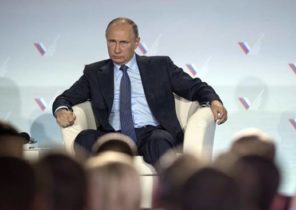At a time when observers talk about a new cold war between the US and China, politicians seem to misunderstand the Chinese-Russian relationship in the Arctic, including their Union. This is partly due to the lack of a quantitative framework for understanding the ongoing changes in the international system: the return of nationalism, the destruction of rule-based liberal order and the emergence of non-traditional security threats, such as climate change. Incorrect interpretation of the relations in the Arctic region also stems from a lack of politicians with expertise that is driven by the Chinese-Russian relations — a failure that will directly affect future understanding of the Arctic region.
After the annexation of the Crimea by Russia in 2014, Western sanctions have led to the fact that existing capital and technology reserves for Russian energy projects in the region dried up. The sanctions were directed against the Western companies cooperating with Russian energy companies and investing in Russian Arctic projects, paving the way to the region, Chinese state companies showing interest in him. The Kremlin’s need for foreign capital, Beijing provides the position of power in the Arctic, but Russia is wary of Chinese investment. Moscow considers the potential of cooperation with Beijing and pitfalls: excessive dependence of Russia on China to implement its plans to ensure the economic security of the Arctic may increase the presence of Beijing in the region.
The Russian-Chinese partnership in the Arctic is not an Alliance — it is based on the business. Despite the presence of the parties mutual interests in the region, based on their interaction lies the pragmatism and commercial viability. At the moment, the partnership in the Arctic is carried out in circumvention of the existing differences, such as the refusal of Beijing to recognize the legitimacy of Russia’s annexation of Crimea and Moscow’s interference in the developing Indo-Chinese conflict. Any regional cooperation due to their common interest in maintaining internal stability. Long-term economic development and the viability and effectiveness of non-Western multilateral organizations such as the Shanghai cooperation organization, are crucial to their shared vision of world order.
Both Russia and China are showing a strategic interest in the rich resources of the Arctic, but, according to the USGS, most of the known deposits of oil and natural gas within the designated exclusive economic zones (EEZ) of the States of the Arctic region. In this sense, Beijing is limited by international law. But China is the international waters of the Arctic ocean, which it deems in the public domain. This understanding lies at the heart of the Arctic project of identity of Beijing: on this basis, China considers itself a “colorchecker” state.
Because of its geographical position, Russia is a major influential player in the Arctic, the largest stakeholder, which accounts for the largest part of the reserves of natural gas and oil in the region. As already mentioned, these resources are clearly fit within the EEZ of Moscow — with the right access and field development outside Russia in accordance with international law. Therefore, the statements about the so-called big game resource in the Arctic are incorrect. In the Arctic can’t be a race for resources, as winners are mostly already defined. Enormous resource potential of Russian Arctic EEZ is the future economic base of the country, and Moscow will protect its energy projects as a means of ensuring national security.
China and Russia do have a natural affinity in terms of energy security. Energy “appetite” Beijing is insatiable, and he is actively seeking to pursue a strategy of diversification of imports from Africa to the Arctic. A changing climate facilitates year-round navigation through the Russian Northern sea route, which opens Beijing access to Russian Arctic resources (primarily liquefied natural gas) and is a shorter and efficient than other transport corridors. In 2012, Vladimir Putin, who was then Prime Minister of Russia, said: “I am convinced that the growth of the Chinese economy not a threat but a challenge that carries colossal potential for business cooperation — a chance to catch the Chinese wind in the sails of our economy”. Russia, of course, caught the wind in the Arctic, happily taking from Beijing capital injection for the development of the Northern sea route and construction of infrastructure, such as icebreakers, as well as taking Chinese investment in Arctic energy ventures.
Such commercial transactions involve the warming of relations, but partnership in the Arctic should be considered from the point of view of the Russian proverb: “Trust, but verify”. Putin and Chinese President XI Jinping was careful, as evidenced by the fact that the signing of bilateral deals has been delayed. Historically, relations between Russia and China is marked by some hostility and mutual suspicion — not only among political elites. This is more evident on the Russian side than to the Chinese. With Beijing’s relations painted relative indifference. But judging by the polls, the attitude of Russians to China increasingly wary, and the level of sympathy and appreciative attitude to the Beijing decreased from 72% in 2019 to 65% in 2020.
Located in the Arctic Russian gas giant NOVATEK limited the impact of Beijing: the Chinese state structure, cannot own a controlling stake in the joint Arctic enterprises, such as the project “Yamal LNG”, which will allow to supply the world market with 16.5 million tons of liquefied natural gas. The share of Chinese national oil Corporation in NOVATEK is 20%, and 9.9% of the shares belong to the Chinese silk road Fund, 20% owned by the French total company (Total) and the owner of a controlling stake (50.1 per cent) is “NOVATEK”. And there is no reason to believe that Moscow will abandon this policy in the second joint venture of NOVATEK owns 60% stake, 10% of the total, 10% — the consortium of Japanese companies, and 20% of the Chinese firms.
In cooperation of Russia and China in the Arctic are reflected friction of the parties about their positions in a multipolar system. The Arctic Council, the only control structure in the region for many years has deferred consideration of the application of China to participate in the work of the Council as an observer country, as Russia and Canada were apprehensive about the internationalization of the Arctic. In 2013, China became an official observer in accordance with the new refined criteria, the observer States should “recognize the sovereignty of Arctic States” and related to the topic of the Arctic ocean “substantial legal basis”, including in particular the international law of the sea. Beijing signed an international agreement that actually requires recognition of the sovereignty of the Arctic States, including the demarcated Maritime zones.
In addition, joint activities of Russia and China in the Arctic are still some differences. Published in 2018 Arctic policy of China is contrary to its obligations as an observer of the Arctic Council. China seems to be a compliance regime in the Arctic sea routes, in accordance with the UN Convention on the international Maritime law. But the principles of the Arctic policy of China in 2018 causes tensions with Russia over article 234, known as “ice-Covered areas,” which grants coastal States special authority to regulate the activities in ice-covered areas within the limits of its national jurisdiction. As a result of global warming climate change year-round ice cover decreases, the Beijing likely to oppose Moscow in the matter of the application of article 234 and to strive for freedom of navigation in international waters these castanaveras sea route.
In June, Moscow has accused one of the leading Russian scientists, specialist in study of the Arctic Valery Mitko espionage in favor of Beijing. Mitko is accused of treason for passing to China classified information about Arctic studies and underwater touch technology. But perhaps more revealing is how the two countries had hushed up the incident, not giving official comment on the arrest. At this point, Beijing and Moscow seems to have decided to stay at their opinions — while thriving Arctic gas business.
And outside the Arctic exist in Russian-Chinese relations contradictions exacerbated the pandemic coronavirus. Intensified the competition between the two countries for influence in South-East Asia. In the framework of efforts to combat the coronavirus, which recently held Moscow, the program was implemented to assist medical institutions and put forward the initiative of holding multilateral consultations, exchange of experience among countries in the region and training of personnel in the fight against pandemics in the future. Competition between the two countries using “soft power” was further developed, when Beijing and Moscow began to supply the European countries masks and ventilators.
In General, the fact that China is engaged in the Arctic in the framework of a mutually beneficial partnership with Russia, probably in the interests of the West, because of the agreement with Moscow several constrain Beijing. It is unlikely that Western stakeholders can mobilize resources and direct them against the two aggressive States in the Arctic. Over the last decade, Moscow began to feel more confident and will probably be difficult to persuade her to cooperate with the West.
If Russia will stick to its course, then, strengthening its cooperation with Beijing, it will be guided primarily by commercial interests. It’s hard to imagine based on today’s strategic cooperation in the Arctic there is a Union of equals.







